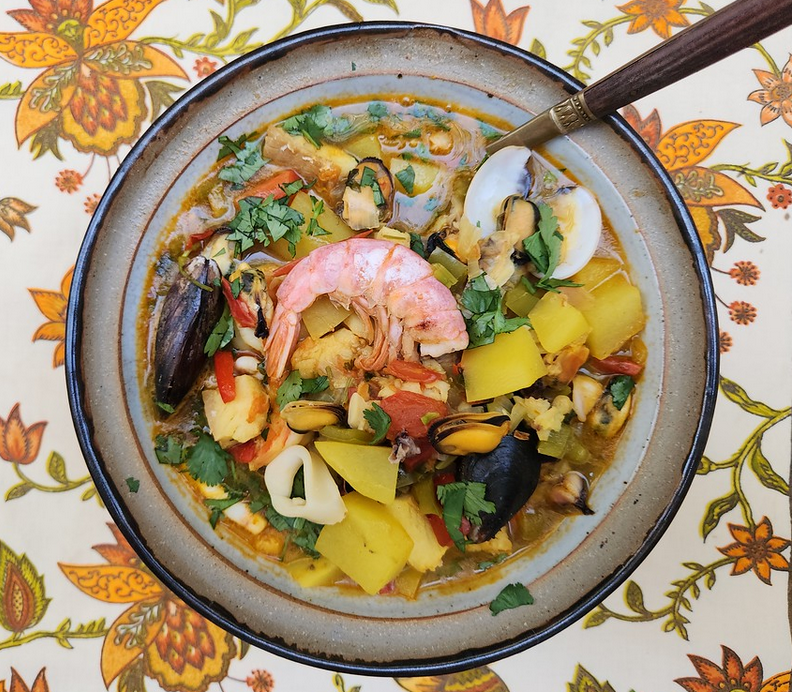
Norwegian Medisterkaker with Surkal and a dollop of blackberry preserves
This month's recipe is Norwegian Medisterkaker with Surkal. Medistarkakar are pork meatballs or patties, and Surkal is a cabbage and apple sauerkraut. Both are relatively easy to make and use easy-to-find ingredients.
The inspiration for this month's recipe is the Norwegian book Bell in the Lake written by Lars Mitting. The book was a former Book of the Month selection and is the Worldview Project's book club selection for July. For a time, it was the #1 best selling book in Norway. Being so far north Norway is subject to very long and brutal winters. As such, in addition to lots of fish (Norwegian Salmon was the first Salmon sushi in Japan!), hearty dishes made of lamb and pork have long been favored by Norwegians. Traditionally (that is in the 18th and 19th centuries) the most popular foods grown in Norway are cabbages and root crops such as, potatoes, turnips, onions and carrots. Relatively cool summers are good for a wide variety of both wild berries (cloud berries, bilberries, lingonberries, Rowan berries, crow berries, stone brambleberries, etc.) and cultivated berries (strawberries, raspberries, and blueberries). Orchard fruits such as apples, pears, plums and cherries are also cultivated. "Growing your own food" has not been popular among non-farmers in Norway, but recently there has been an explosion of interest in doing so, and so as a result, garden equipment, seeds and soil improvement product sales are booming.
Milk, butter and cheese have also been tremendously important foods in Norway. Norwegians developed a rather unique method of farming known as seter which can be roughly translated as "summer dairy". These were outlying mountainous areas where cattle and sheep were taken for the summer. They had only basic living quarters (known as sel) for the budei (milkmaids) and gjeterjente (cowherd girl or boy). These areas were sometimes quite distant from the family farms, and often the annual journeys to and from the seter were difficult both for the animals and family members. This summertime pattern of tending livestock in areas which were snow-covered for much of the year prevented overgrazing on the farmsteads. During the summer, the budie would milk the cows, churn butter and make cheese. They and their family members would also harvest hay and collect other fodder for their livestock in preparation for the long and harsh winter ahead. While entire families were often involved in the move up the mountain, typically only the budie and gjeterjente remained throughout the short summer. As they were typically young unmarried young people, summer romances and trysts were not uncommon. Also, Norwegian traditional imperatives regarding hospitality meant wayfaring strangers could always find a bed and a bit of food at the seter. Otherwise, for the young women and men, seter life could be rather lonely.
Medisterkaker are pork meatballs (or patties) bound with whole milk and potato starch (flour) and seasoned with nutmeg, ground ginger and pepper. It's important to buy or make the ground pork with some fat in it (80/20). Also, whole milk works best. Because of the amount of milk used, it is difficult to form the meat mixture into round meatballs, and yours might look like small patties. For consistency I used a scale to ensure the Medisterkaker were 2 ounces each. I ended up setting aside a frying pan's worth of the portions before I fried them. This made filling the frying pan much faster and allowed for easier control of the cooking times. The medisterkaker are served by themselves, in hot water, broth or gravy.
Surkal is an unfermented cabbage slaw where the vinegar is tempered and the dish made slightly sweet with the addition of apples and a small amount of sugar. Its taste is enhanced by caraway seeds (as is common with other slaws).
As mentioned previously, most of the ingredients for these recipes are easy to find, but my local supermarket didn't carry any potato starch. I found some at Bristol Farms, but I would guess that Whole Foods and Sprouts also have potato starch. The combination of potato starch and milk make the patties softer and less dry than they would otherwise be.
Medisterkaker Ingredients:
- 2 pounds of ground pork
- 1 cup of whole milk
- 5 tablespoons of potato starch (flour)
- 1/2 teaspoon nutmeg
- 1/2 teaspoon ginger
- 3/4 teaspoon black pepper
- 2 teaspoons salt
Medisterkaker Preparation:
- Mix together the ground pork, potato starch, and all the spices.
- Add milk a little at a time until the mixture is a very heavy paste (not too firm)
- Form into meat balls or patties (typically, the meatballs are on the medium-large size, 2 inches or a bit more in diameter).
- Brown in an oiled frying pan. If making meatballs (instead of patties), you can finish them off in a 350° oven.
Surkal Ingredients:
- 1 1/2 pound shredded green cabbage
- 2 apples cored and shredded
- 2 cups white vinegar (note: I used half white and half apple cider vinegar, and it tasted great!)
- 4 tablespoons butter
- 2 tablespoons sugar
- 1/2 tablespoon caraway seeds
- 2 teaspoons salt
Surkal Preparation:
- Shred the cabbage with a knife, mandolin or a food processor slicing attachment.
- Shred the apple with a course grater or a mandolin with a julienne 4.5mm setting. You can leave the skins on if you so desire.*
- Melt the butter in a quart pot on medium heat.
- Add the cabbage, apple, caraway seeds, sugar and salt and mix
- Stir frequently until the cabbage has wilted.
- Add the vinegar and bring to a boil.
- Reduce heat to low simmer.
- Simmer for 90 minutes until little or no vinegar remains.
- Serve garnished with chopped parsley.
* Unless you use very hard apples (like a Granny Smith or Pippin), it might be difficult to grate the apples unless your grater is very sharp. Mine isn't, so I used a mandolin which worked very well. You can also julienne the apples with a knife, just make sure the pieces are thinly cut.
Håper det smaker! (bon appétit, enjoy your meal)
Recipe and photos T. Johnston-O'Neill









